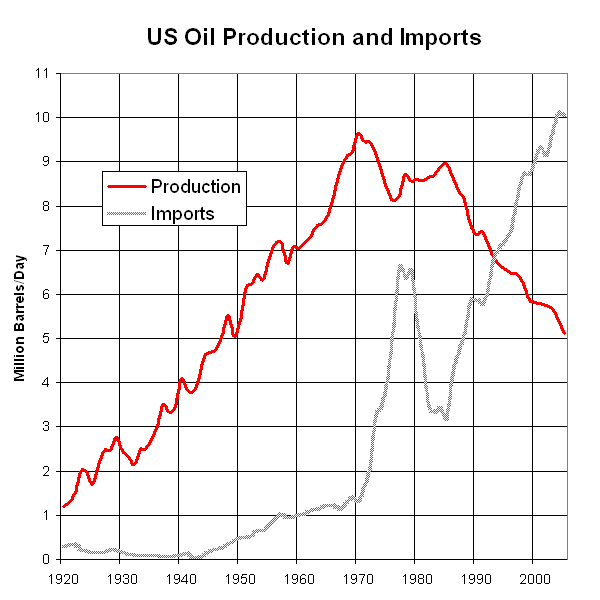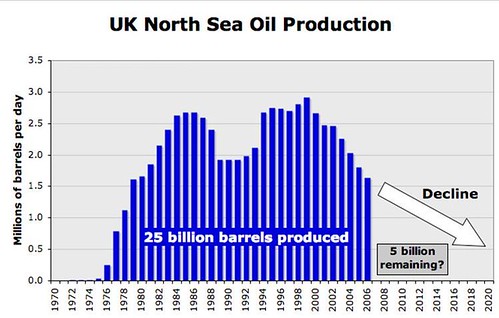MachineGhost wrote:
MediumTex wrote:
What BP is talking about is just noise. No country that is 40 years past its peak in oil production is ever going to be expected to do much more than slow the decline rate.
All of the new production coming online may offset decline rates of existing fields for a while, but the trend is always down when you get this far past the production peak. That's the whole peak oil theory.
BP knows this.
BP didn't say anything about peak oil, they were talking about U.S. dependence on foreign energy, i.e. "energy independence".
I now have to wonder why "energy independence" is such a big freaking deal if the previous level was only 70% domestic dependence and now its up to only 81%. It's already a super-majority, not a dire situation! Big [NeoCon] hat. No cattle.
MG
What BP knows is that what they are projecting will never happen. It can't happen. The U.S. economy, along with every other industrialized economy is premised upon continual economic growth, and continual economic growth requires continually increasing natural resource inputs.
If economic growth requires continual increases in natural resource inputs and your own country is in terminal production decline (as all regions are post-peak), then it necessarily means that there will be either (i) increased reliance on imports or (ii) a reduction in overall economic output.
The important thing to keep your eye on when talking about energy is that globalization has made many countries
appear to have become more energy efficient in recent decades (based on things like BTUs necessary for each increment of economic output), but the reason this appears to be happening is that these countries have simply offshored more energy intensive functions to production centers with lower labor costs and fewer environmental regulations. If anything, this process leads to less overall energy efficiency, not more, since a Chinese factory may have a lot fewer energy efficiency mandates than the factory it replaces in Ohio.
Remember that modern capitalism is the search for ever-more efficient ways of converting the maximum amount of natural resources into garbage. We call that "progress" and when it slows down we call it a recession.
BP isn't dumb. They know that in order for energy companies to keep from being demonized as these processes begin to create political, social and cultural friction as they rub up against our treasured beliefs it will be necessary to get out in front of things by creating a set of narratives like "the U.S. will be free of foreign oil by X date."
Here is a brief history of this sort of thing from a 2004 article:
By January 1974, oil prices had risen from $3 to $11 per barrel. In response to the embargo, President Richard Nixon did lots of counterproductive things, including imposing oil price controls and lowering highway speed limits. Nixon also launched Project Independence, declaring, "Let this be our national goal: At the end of this decade, in the year 1980, the United States will not be dependent on any other country for the energy we need to provide our jobs, to heat our homes, and to keep our transportation moving."
...
President Gerald Ford moved the date for achieving American energy independence back to 1985. (Auto Aside: Ford signed the 1975 Energy Policy and Conservation Act, which set federal standards for energy efficiency in new cars for the first time.)
President Jimmy Carter made energy policy the centerpiece of his administration. He notoriously declared on April 18, 1977, that achieving energy independence was the "moral equivalent of war." In August of that year, Carter signed the law creating the United States Department of Energy, intended to manage America's energy crisis.
...
In 1991, in the prelude to the First Gulf War, President George H.W. Bush announced a hodgepodge of proposals as a national energy strategy. Naturally one of his strategy's guiding principles was "reducing our dependence on foreign oil." (Auto aside: President Bush, meeting with representatives of the "Big Three" automakers, announced a jointly funded U.S. Advanced Battery Consortium—a $260 million research project to develop lightweight battery system for electric vehicles.)
...
California experienced a series of rolling blackouts in the first months of George W. Bush's administration. A national energy task force led by Vice President Dick Cheney notoriously devised a national energy policy, released in May 2001. The task force described America's energy situation in stark terms: "America in the year 2001 faces the most serious energy shortage since the oil embargoes of the 1970s. . . . A fundamental imbalance between supply and demand defines our nation's energy crisis."
"What people need to hear loud and clear is that we're running out of energy in America," said Bush in May 2001. "We can do a better job in conservation, but we darn sure have to do a better job of finding more supply." He added, "We can't conserve our way to energy independence."
Nevertheless, George W. Bush repeated recent presidential history by insisting, in his 2003 State of the Union address, that one of his administration's goals was "to promote energy independence for our country." (Auto aside: In that speech, Bush announced his $1.2 billion FreedomCar proposal to develop hydrogen fueled vehicles.)
John Kerry, the presumed Democratic presidential candidate, says he too has a plan for energy independence. "It's time to make energy independence a national priority—and to put in place a plan that frees our nation from the grip of Mideast oil in the next ten years," he intones in a campaign ad.
http://reason.com/archives/2004/07/21/e ... the-ever-r
If you wonder what actually happened to foreign oil imports to the U.S. since 1973, take a look:

If you knew for certain that domestic oil production was in terminal decline and you knew that a healthy economy required increasing fossil fuel inputs, what would you guess about the future of that curve above?







